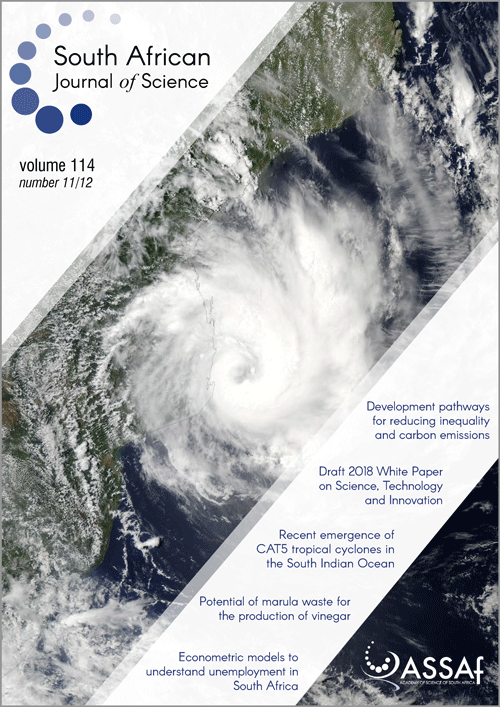Applying the water-energy-food nexus to farm profitability in the Middle Breede Catchment, South Africa
DOI:
https://doi.org/10.17159/sajs.2018/5062Keywords:
water quality, farm budget models, Breede River, water security solutions, gravity-fed irrigationAbstract
The water-energy-food nexus has emerged as a useful concept to understand the multiple interdependencies that exist between the water, energy and food sectors. The nexus is an ambitious attempt to work across disciplines and scales to understand the workings of these complex systems. It is, however, criticised for being more of a general framework than a practical methodology because of the vast amount of data it would need to make real-life contributions to sustainable development. We show how the nexus approach, when used within a farm budget model, can transform the problem focus in water governance. By changing the relationship among water, energy and food production of a farm, profitability is significantly changed. The water-energy-food nexus debate is discussed within the context of the South African water sector, particularly the Breede River Catchment. Working from within the farm budget model, we demonstrate the impact of moving from an irrigation canal system that requires electricity for pumping, to a gravity-fed piped irrigation system in the Middle Breede River. The finding is that the water-energy-food nexus has the potential to unlock groundbreaking solutions to complex problems in agricultural water management when used in appropriate modelling systems.
Significance:
- The water-energy-food nexus approach can lead to an entirely new framing of water governance problems and therefore solutions to these problems.
- The water-energy-food nexus when used in farm budget models can identify ways of altering farm profitability.
- By addressing the energy cost of farming through an irrigation pipeline system in parts of the Breede Catchment Area, farm profitability could significantly increase.
- A gravity-fed closed pipeline system in parts of the Breede River can improve water availability and reduce farm and management costs.
Published
Issue
Section
License

All articles are published under a Creative Commons Attribution 4.0 International Licence
Copyright is retained by the authors. Readers are welcome to reproduce, share and adapt the content without permission provided the source is attributed.
Disclaimer: The publisher and editors accept no responsibility for statements made by the authors
How to Cite
- Abstract 1217
- PDF 862
- EPUB 196
- XML 412












.png)